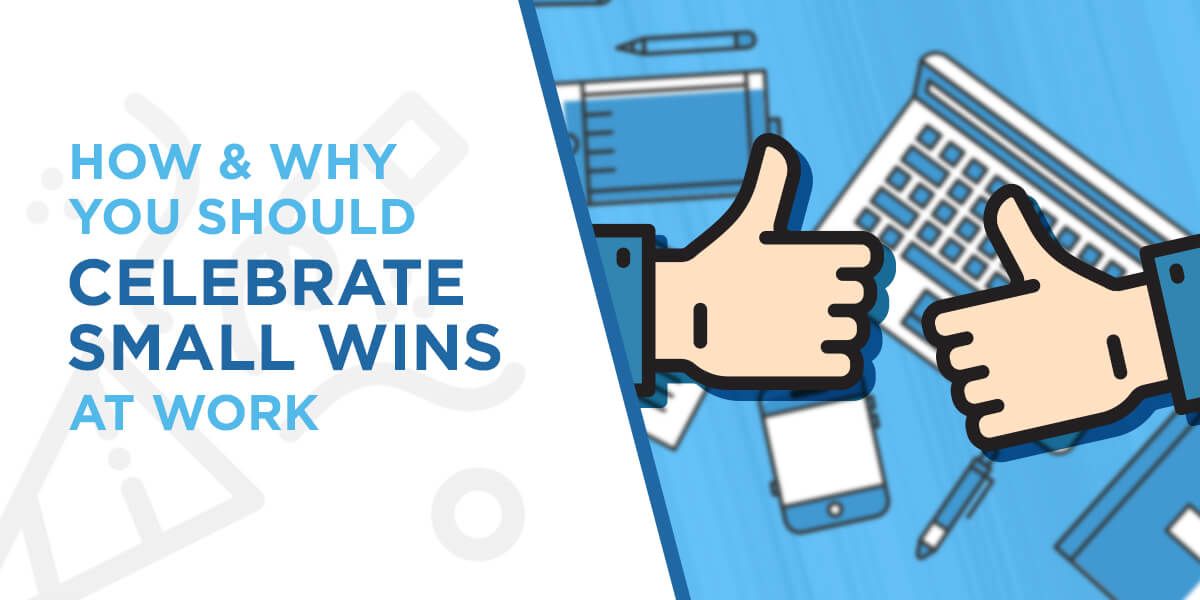How and Why You Should Celebrate Small Wins at Work

Has your to-do list been a little long lately? Don’t beat yourself up. Perhaps you’ve set standards a bit too high or you’re trying to do too many things at once. Take a step back and reevaluate your goals. You’re only human, after all.
Nowadays, there’s a lot of pressure to produce results. The higher the numbers and the bigger the payout, the better. And while achieving big goals is certainly something to celebrate, it’s just as important to take note of your small wins. These have been defined as “modest behavior changes that can set off a chain reaction of more and better changes.”
THE SCIENCE OF SMALL WINS FOR WORK MOTIVATION
Teresa M. Amabile and Steven J. Kramer have conducted several research studies on the psychological experiences and the performance of people doing complex work inside organizations. In the 15 years they conducted their study, Amabile and Kramer observed that the combination of emotions, motivations, and perceptions affects the quality of our workday.
While it’s important to have a list of your big objectives, it also takes time to scratch each one off that list. This is why you should put more weight on your minor milestones. Amabile and Kramer posit in “The Power of Small Wins” that “even ordinary, incremental progress can increase people’s engagement in the work and their happiness during the workday.”

Karl E. Weick, an authority on organizational behavior and psychology, has also written about small wins. He discussed how our tasks become more manageable when broken down.
When we break down large problems into small wins, three things happen, Weick writes:
“First, the importance of any single win is reduced in the sense that the costs of failure are small and the rewards of success considerable.
“Second, the size of the demand itself is reduced.
“And third, existing skills are perceived as sufficient to deal with the modest demands that will be confronted.”
B.J. Fogg, Director of Stanford University’s Behavior Design Lab, has developed a program for the celebration of small wins called Tiny Habits. Under this program, Fogg mentors people on creating new habits, and he has also certified people on how to coach others. According to his program, only three things can affect your behavior in the long run: an epiphany, a change in environment, or taking baby steps.
HOW TO ID YOUR SMALL WINS

Unfortunately — or maybe not — opening your email and refreshing three times an hour does not count as a small win. Keep your small wins relevant. Take a big goal and list down all the things you need to do to accomplish it. Count each task you accomplish as a win.
Antoine de Saint-Exupéry said it best: “A goal without a plan is just a wish.” So map out what you need to do to get to your goal.
Here’s how:
Brainstorm! And list down all the things that need doing.
No need to overthink this. You can always add more things to this list later. What’s important is to visualize the steps you need to take to get where you want to be.
Prioritize your to-do list.
Organize tasks by difficulty or by feasibility. We do recommend eating the frog first — or tackling the biggest, most important task — so that you won’t be tempted to procrastinate on it later on.
Schedule your mini-tasks.
Plot them in a planner, set up alarms on your phone’s to-do list, or keep sticky notes on your journal — whatever works as an effective reminder for you, do it! And remember to follow through!
HOW YOU CAN CELEBRATE SMALL VICTORIES AT WORK

Celebrating small wins serves as your reward for achieving minor milestones. These rewards, in turn, motivate you to keep up the habit.
Here are a few things you can do to celebrate your small wins:
Keep track of your progress to see how far you’ve come
A visual representation of your progress h — no matter how minuscule — is a great motivator! Even having a tiny notepad handy where you can write down your small wins is super useful.
Reward yourself with a (healthy) snack.
Yes, sweets are nice pick-me-ups, but they’re not good for you in the long run. Instead, keep fresh fruit or nuts on hand to snack on along with a good mix of nutrient boosters.
Mind your posture, take a walk, and hydrate!
In case you weren’t already aware, sitting in front of your laptop all day isn’t good for our overall health.
Take a social media break.
It’s no secret that social media is a rabbit hole of content, information, and instant gratification. Unfortunately, it also makes it too easy to compare ourselves with what we see online — which isn’t always a confidence booster. Switch to “do not disturb” during critical work hours to keep your focus on what matters most.
Vent if you must — but make it constructive.
No matter how fun your workdays are, you’re bound to get stressed now and then. And while it’s a relief to vent and rant to a coworker about your office woes, try to focus on the things you can change instead of the things you can’t (right now). Negative energy tends to be toxic, even if unintentional.

Get some sunlight or exercise or both!
These can cheer you up like nothing else! They’re great alternatives to coffee if you’re on a java break. And sunlight and exercise are also awesome health-wise.
Declutter your space.
It’s incredibly satisfying to see an organized space. Whether you’re working from home or at an office space, take a few minutes to maintain a neat desk before and after your workday.
Learn something new.
If you’re practicing the Pomodoro technique (which you totally should!), you get to have a five-minute break for every 25 minutes of work! Use these breaks to read up on industry news or an article of interest. You can also try out a brain exercise!
List down 3 things you appreciate and 3 things to improve on yourself
Already have some in mind? Awesome! Write them down when you’re in a happy disposition so you have something to remind you of the good things in life when you’re feeling too stressed out.
Reflect on your day and remember that you’re only human.
Yes, you have access to all of these productivity tools — so much so that you juggle tasks on the daily. But just because you can do something doesn’t mean you should. It’s okay to have down days. You’re only human. You can try again tomorrow.
SMALL STEPS TOWARDS A SENSE OF ACCOMPLISHMENT

Breaking down your big goals into smaller chunks turns them into more manageable increments. This way, you’re not staring down what seems like a never-ending road to success.
If you feel like you’ve been stuck in a rut lately, try a change of pace. Check out LOFT’s flexible workspaces! There’s nothing like a community of solopreneurs, digital nomads, independent professionals, and industry experts to support you on your way to the top.
Book a tour of our coworking spaces today! Reach out to [email protected]. We’d love to work with you.